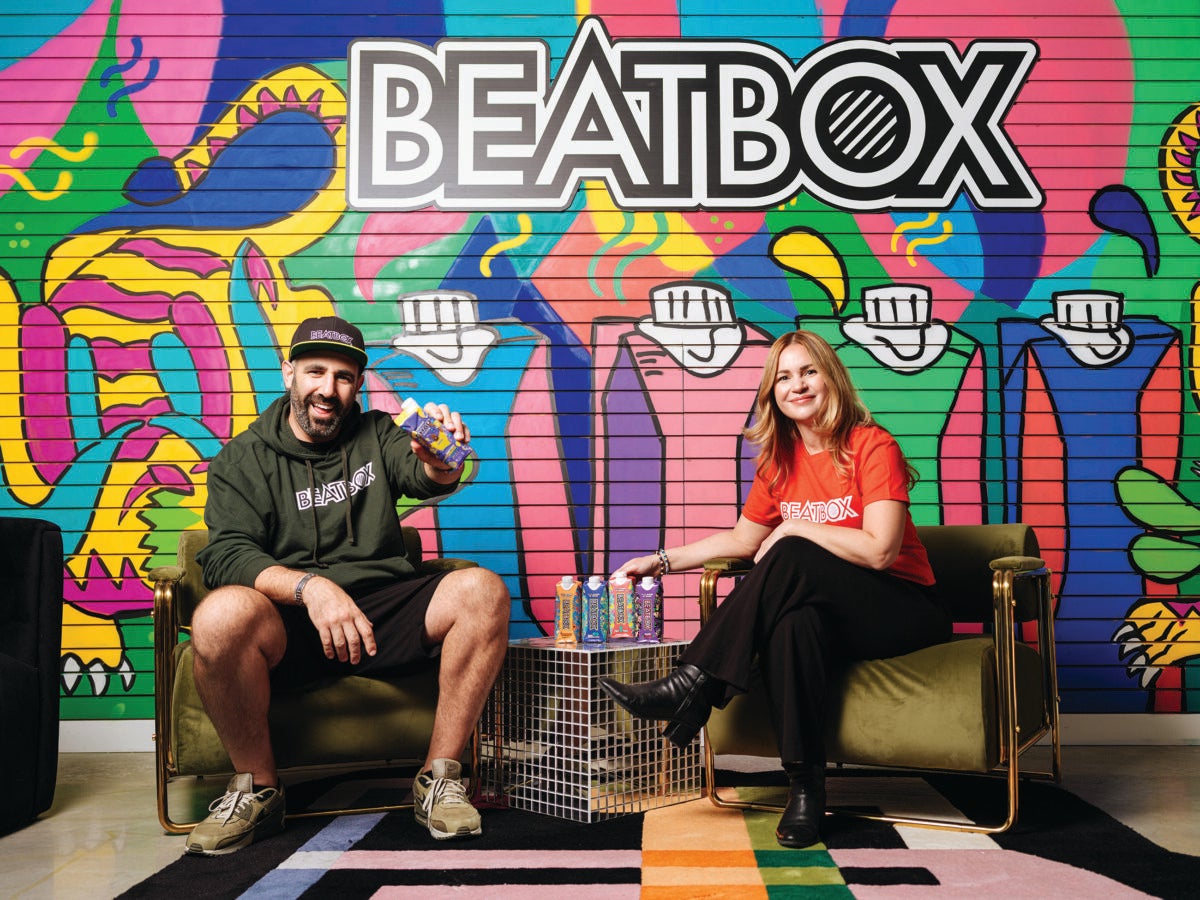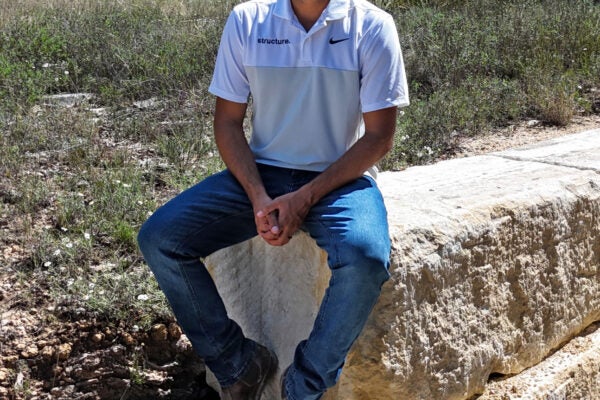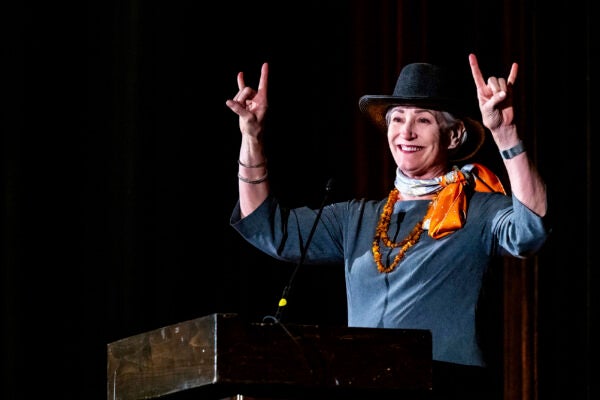Leading with Authenticity
BeatBox Beverage founders Justin Fenchel, MBA ’13, and Aimy Steadman, MBA ’13, went from B School to boxed wine stardom, with a focus on developing workers and keeping them
By Alice Popovici
Photograph By Josh Huskin
As McCombs students, Justin Fenchel, MBA ’13, and Aimy Steadman, B.S. ’08, MBA ’13, were regulars at the concerts, festivals, and tailgate parties that are in the DNA of Austin’s unique culture, but they were missing an alcoholic beverage that was portable and fruit-flavored to enjoy at those events. That desire juiced their creativity, inspiring an entrepreneurial path. The result? BeatBox, a wine-based drink that comes in flavors such as Blue Razzberry, Fruit Punch, and Juicy Mango.
The duo started small, blending and refining their flavorful concoctions in a small North Austin warehouse, then distributing the drinks to local stores and slowly building a customer base. Fast forward 14 years and BeatBox — which comes in more than 15 flavors, has 11.1% alcohol by volume, and packs a sweet punch in each one of its brightly colored Tetra Pak containers — has expanded nationwide, generating over $200 million in sales in just the past year.
The beverages, sold primarily in the beer section of convenience stores, are marketed to millennial and Gen Z customers. A sponsor of a main stage at the most recent Austin City Limits Music Festival, BeatBox is about to launch globally, including in the U.K., Canada, Mexico, and Europe.
Working long hours and juggling multiple roles is something of a rite of passage for young entrepreneurs, but for Fenchel, Steadman, and Fenchel’s lifelong friend Brad Schultz, those years of hard work continue to pay off. Fenchel, the company’s CEO, says having had firsthand experience filling each of the company’s roles — from the details of making the beverages to selling and distribution, to hiring the staff, and to balancing the company’s budget — made him a better leader.
His strategy? Leading from behind.
“A lot of companies can run into trouble where founders hold on to too many things for too long because they think they can do it the best,” Fenchel says. “For us, hiring people who are experts in their field and are really good at what they do, and then empowering them to just do it and not get in their way, is super important.”

Employees increasingly seek autonomy, feedback, and transparency from their leaders, according to such sources as the Harvard Business Review’s report, “Helping Gen Z Employees Find Their Place at Work.” Research shows how important it is to lead today in a way that is flexible and demonstrates soft skills such as listening to workers and offering benefits that demonstrate they care for employees and will promote their professional development.
McCombs roots
BeatBox came together when Fenchel and fellow MBA classmates Steadman, Dan Singer, MBA ’13, and Jason Schieck, MBA ’13, teamed up with Schultz to create a company that reflected the uplifting vibe and sense of community they often found at music festivals. (Singer and Schieck left the company after graduation to pursue other jobs.) Their first big break came in early 2014, when a McCombs Hall of Famer, the late Alan Dreeben, BBA ’65, offered BeatBox a distribution deal with his company, Republic National Distributing Company.
Within a few months, the entrepreneurs were competing on the TV show “Shark Tank,” where they memorably showed up with a stereo-shaped container of boxed wine and secured a $1 million investment from billionaire investor Mark Cuban.
But it took several more years for BeatBox to find its niche, Steadman says. After the company repackaged its product and overhauled its distribution strategy, switching from wine and liquor wholesalers to beer distributors, sales began to take off.
“We had a lot of convenience stores that wanted our products, because that’s where people in the millennial and Gen Z demographic shop for alcohol,” says Steadman, the company’s chief operating officer. “We needed something that was more like a single serving, not a party-sized product, and so we switched to these 500-milliliter Tetra Paks.”

Fenchel and Steadman credit McCombs, including their business courses and the professors who advised them, with teaching them how to approach leadership. For Steadman, the lessons boiled down to innovation, authenticity, and engagement. BeatBox also benefited from their experience as an alumni company of the McCombs TVL Accelerator’s Spring 2014 and Spring 2016 cohorts.
A flexible leadership style also is important to the two, not just when guiding employees, but with honing business strategies. In particular, Steadman recalls learning from one of her former professors, Rob Adams, who taught entrepreneurship courses at McCombs and is the former director of Texas Venture Labs. She says Adams’ book on market validation, “If You Build It, Will They Come?” has been an invaluable resource as BeatBox continues to refine its products in response to customer feedback.
To keep track of consumers’ evolving tastes and preferences, BeatBox employees engage with customers on a regular basis, including on social media and in person at music events. In addition, BeatBox seeks feedback on an internal messaging platform similar to Slack that has drawn about 10,000 members whom Steadman refers to as “BeatBox family.”
“We can say, ‘Hey, what do you think about this new flavor?’” Steadman says. “Eventually, you build something that people really love, because you integrated those feedback loops into your innovation process.”
Building for the future
As BeatBox grew from a handful of recent MBA graduates to a team of over 270 employees in just a few years, Steadman’s leadership also evolved. “As a leader, I really had to switch my focus and my skill set from getting a lot done and having the pitch, the startup story, the exciting story that other people could buy into,” she explains. “These days, it’s much more about finding amazing people.”
Staying true to the company’s festival culture roots appeals to workers as well as customers, Steadman says. “For us, authenticity is important,” she says. “Listening to our teammates, listening to our partners and their needs.”
Every four to six months, it is a new company. You have to be proactive and not reactive. You have to be constantly looking forward.”
—CEO Justin Fenchel
Part of that means building the kind of modern company that many employees are looking for — where they feel heard, empowered, and motivated. Steadman says BeatBox provides benefits to support team members, including a life concierge who helps employees deal with matters outside of work, such as finding a plumber or securing day care for their children.
These days, BeatBox is growing at a pace that causes company leaders to constantly recalibrate and reevaluate their strategy, Fenchel says. “Every four to six months, it is a new company,” he says. “You have to be proactive and not reactive. You have to be constantly looking forward.”
From the start, Fenchel says, he and the other co-founders incorporated “next-generation values” such as sustainability, transparency, and inclusiveness into their business. BeatBox is now a certified B Corp and has been recognized for prioritizing sustainable growth and for its social and environmental leadership. For instance, the company has recently been certified as “plastic neutral,” meaning it offsets plastic used in the company by supporting programs to remove and recover the equivalent amount of plastic from
the environment.
Finding and hiring people who are not only skilled but also have goals aligned with the company’s mission are crucial to its success, Fenchel says. When he is interviewing job candidates, instead of asking what they can do for the company — a common interview question — he digs deeper.
He asks: “How can we be a platform for you to grow as a person? To grow your skills to eventually get to the place you want to go?”
About this Post
Share:


